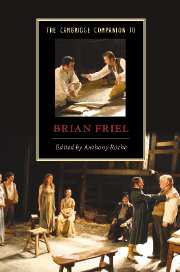Book contents
- Frontmatter
- 1 Introduction
- 2 The early plays
- 3 Surviving the 1960s: three plays by Brian Friel 1968-1971
- 4 Friel and the Northern Ireland “Troubles” play
- 5 Family affairs: Friel’s plays of the late 1970s
- 6 Five ways of looking at Faith Healer
- 7 Translations, the Field Day debate and the re-imagining of Irish identity
- 8 Dancing at Lughnasaand the unfinished revolution
- 9 The late plays
- 10 Friel’s Irish Russia
- 11 Friel and performance history
- 12 Friel’s dramaturgy: the visual dimension
- 13 Performativity, unruly bodies and gender in Brian Friel’s drama
- 14 Brian Friel as postcolonial playwright
- Bibliography
- Index
4 - Friel and the Northern Ireland “Troubles” play
Published online by Cambridge University Press: 28 January 2007
- Frontmatter
- 1 Introduction
- 2 The early plays
- 3 Surviving the 1960s: three plays by Brian Friel 1968-1971
- 4 Friel and the Northern Ireland “Troubles” play
- 5 Family affairs: Friel’s plays of the late 1970s
- 6 Five ways of looking at Faith Healer
- 7 Translations, the Field Day debate and the re-imagining of Irish identity
- 8 Dancing at Lughnasaand the unfinished revolution
- 9 The late plays
- 10 Friel’s Irish Russia
- 11 Friel and performance history
- 12 Friel’s dramaturgy: the visual dimension
- 13 Performativity, unruly bodies and gender in Brian Friel’s drama
- 14 Brian Friel as postcolonial playwright
- Bibliography
- Index
Summary
“Since the fateful year of 1968, everything [Friel] has written has been imbued, however obliquely or indirectly, with the events of the northern crisis.”
Fintan O’Toole, The Irish Times, 7 January 1989Seldom in my experience has a topic such as the one I intend to address here been, at the same time, both so straightforward and so mired in complexity. Even if Fintan O'Toole had qualified the above assertion about the Northern crisis inflecting everything Brian Friel has written since the later 1960s to include only the two plays to be discussed here - The Freedom of the City (1973) and Volunteers (1975) - the matter would be far from settled. Much of the difficulty originates in the phrasing “Friel and the Northern Ireland 'Troubles' play,” a title that implies clear relationships between author, contemporary history and dramatic form and, as a result, situates these plays on a horizon of expectations Friel seemed determined to disappoint.
The Freedom of the City concerns the killing of three innocent civil-rights marchers in Derry by British soldiers, a scenario that parallels the events of “Bloody Sunday” on 30 January 1972, when thirteen civilians were shot by British paratroopers. The similarly doomed protagonists of Volunteers are five internees for whom the term “volunteer” possesses a double resonance in recalling the nationalist commitment of heroes in Ireland's past and commenting ironically on the prisoners' decision to work on an archaeological excavation in Dublin, an unpopular volunteerism which has motivated fellow detainees to plot their murder when they return to their prison block. Like “Bloody Sunday,” internment was in the forefront of political consciousness in the early 1970s after the Special Powers Act was enforced in 1971, leading to the immediate arrests of several hundred men suspected of involvement with the IRA. In part because of this extra-textual reality, this relationship to real historical events, The Freedom of the City and Volunteers seem to elicit greater critical attention - and, especially at the times of their inaugural productions, sharper detraction - than other plays by Friel, and they are often linked together, as they will be here.
- Type
- Chapter
- Information
- The Cambridge Companion to Brian Friel , pp. 30 - 40Publisher: Cambridge University PressPrint publication year: 2006
- 1
- Cited by

